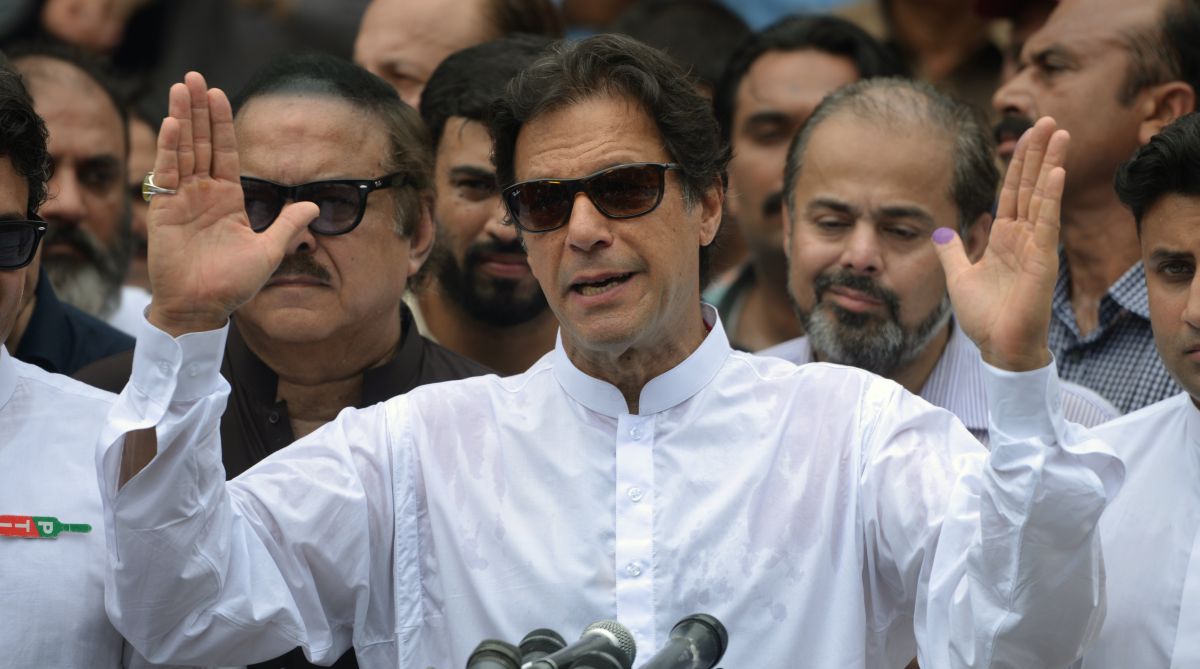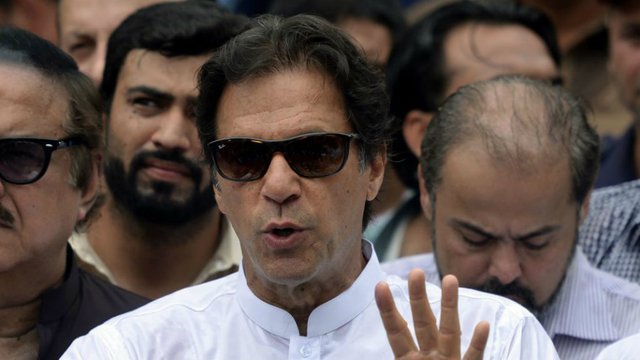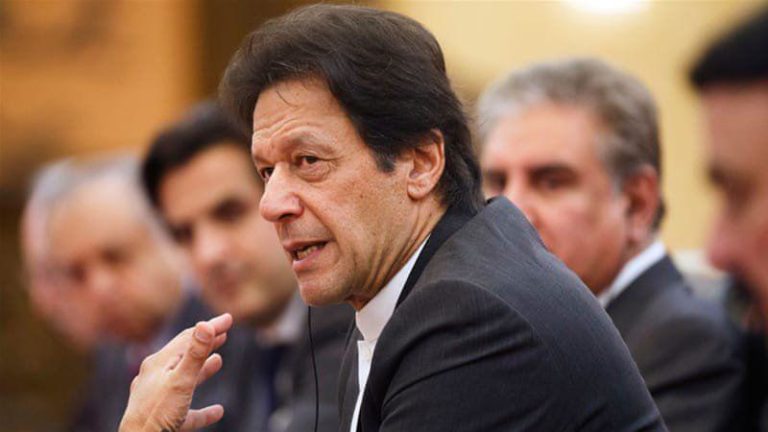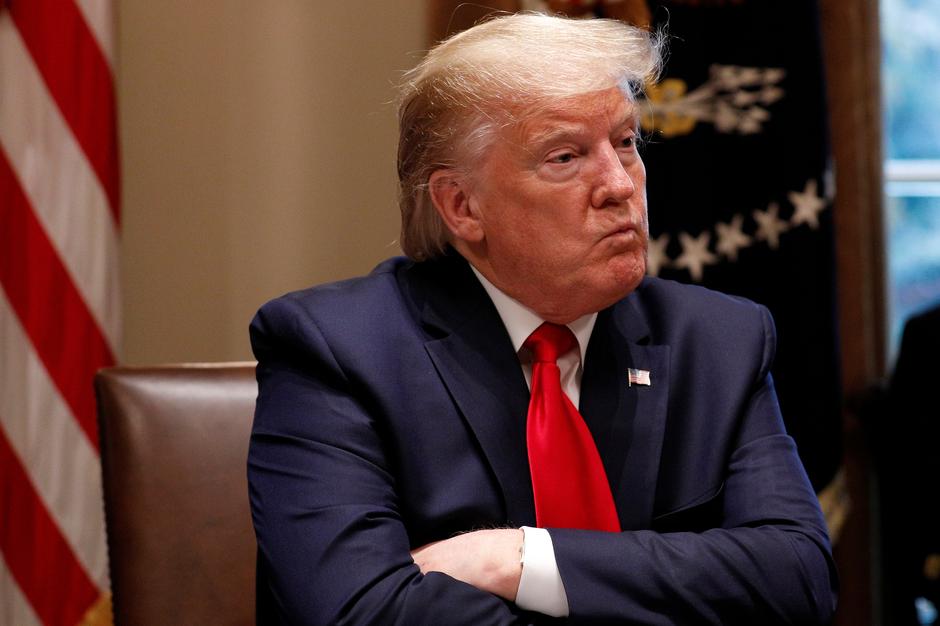Can the Taliban and other terrorists be held to be exclusively responsible for the spurt in violent activities in Afghanistan? Let us search for the origin of the upsurge in violence in this region.
Publish dateSunday 30 September 2018 - 04:51
Story Code : 171753
AVA- Prime Minister Modi and President Ghani have pledged to make efforts to combat the menace of terrorism. For India, the Taliban and other terror groups are responsible for violence in Afghanistan. These terrorist groups have been provided safe havens in Pakistan for carrying on violent activities in Afghanistan.
During the election campaign in Pakistan, Imran Khan’s view of the conflict in Afghanistan was coloured by a sense that the mostly Pashtun Taliban have waged a war of resistance against outside rulers. At the same time, he fiercely criticized American counterterrorism policy in a region plagued by extremism. He has lambasted the Americans for conducting drone strikes and committing butchery. He called NATO a group of western liberals thirsty for blood. He characterized liberals as “blood-suckers” for supporting the war against the Pakistani Taliban.
Pakistan is beset by poverty, political division and militancy, some of which is American-made. During the 1980s, American, Saudi and Pakistani intelligence operatives used Pakistan as a training ground for jihadists who were dispatched across the border to attack Russian soldiers in Afghanistan. After the 1989 Soviet withdrawal from Afghanistan, Pakistan used militants as proxies against its long-term rival and more powerful neighbour, India.
After the U.S. drove the Taliban from power in Afghanistan, following the 9/11 attacks, Pakistan’s military turned a blind eye to Taliban fighters who hid in Pakistan. As the American military effort in Afghanistan enters its sixteenth year, there is a broad consensus among American commanders, diplomats, and intelligence officials that it will never succeed as long as the Taliban continues to enjoy safe havens in Pakistan.
India has charged Pakistan with providing safe havens to the Taliban and other terror groups responsible for violence and destruction in Afghanistan. The Taliban, aided by their supporters, continue to pursue military operations perpetrating violence and destruction, like the recent attack in Ghazni, over several parts of Afghanistan. These offensives are planned and launched by those who are harboured in the neighbourhood of Afghanistan. India’s representative to the UN, Syed Akbaruddin said terror sanctuaries in Afghanistan’s neighbourhood had for years provided safety for the ‘dark agendas of ideologically and operationally-fused terror networks’ like the Taliban, Haqqani network, Daesh, Al-qaeda and its proscribed affiliates such as the Lashkar-e-Taiba and Jaish-e-Mohammed.
India also criticized the UNO for not doing enough to cut off the drug trade that was financing the Taliban with over a billion dollars as it continued its military operations with the support of Pakistan.
President Trump conducted an extraordinary public rebuke of Pakistan. He accused Pakistan’s leaders of giving the United States nothing but lies and deceit in return for $33 billion in aid since 2001, and of providing “safe havens for the terrorists we hunt in Afghanistan.” In the first week of January 1918 Trump ended the week with a re-tweet of a proposal by Senator Rand Paul, calling on the United States to cut off all aid to Pakistan and to spend that money on building roads and bridges in this country. “Good idea Rand!” Trump wrote.
Administration officials in USA rolled out elements of a new get-tough approach to Pakistan. These included a $255 million cut in military aid, placing the country on a “special watch list” of nations that violate religious freedom, and suspending reimbursement payments to the Pakistani military for operations that it conducts to confront militants.
Whatever the genesis of Trump’s approach, he is right to assail Pakistan’s military, which has a long history of tacitly backing the Taliban and other militant groups. For the United States, Pakistan has been a foreign policy Frankenstein’s monster for decades.
Imran Khan’s attitude toward the Taliban has shifted over the years, but his current outlook seems aligned with the Army’s. That is where Taliban factions leave Pakistan alone and seek to be accommodated in Afghan politics, he is sympathetic to or at least tolerant of the movement’s legitimacy. Khan also describes Pakistan as a victim of the American-led war in Afghanistan. He has denounced U.S. drone strikes inside Pakistan and rejected the premises of U.S. counterterrorism policy in the region. “I never thought the Taliban were a threat to Pakistan,” he told. Still, it has always been hard to think of Khan as anti-Western.
In his speech Khan did not reject accommodation with the Trump administration, which has suspended aid to the country, attempted to pressure the Army to arrest members of the Taliban and other militant leaders hiding in its territory, and tried to support a serious peace process to stabilize Afghanistan. With the United States, “We want to have a mutually beneficial relationship,” Khan said. “Up until now, that has been one-way. The U.S. thinks it gives us aid to fight their war.” He added, “We want a balanced relationship.” At a time when the Trump administration has renewed efforts to find a negotiated solution to the war that might allow the United States to reduce or even eliminate its military presence in Afghanistan, Khan has expressed support for such a strategy. He has said, “Afghanistan’s people need peace. We want peace there. If there is peace in Afghanistan, there will be peace in Pakistan.”
Richard G. Olson, the U.S. Ambassador to Pakistan (2012 to 2015) said, “There’s no question that the Pakistanis have been playing a double game with us”. Dan Feldman in an interview said, “What I don’t think will ever work is a public shaming of Pakistan and making them appear to be kowtowing to U.S. demands,”. For two years, the Obama Administration tried to persuade the Pakistani military that religious extremism and tepid economic growth were the largest existential threats to the nation. Instead, the military continued to see India as its primary threat. Obama first boosted aid and then froze it, as Trump did later. Neither tactic worked.
These officials warned that Trump’s diplomatic gun-slinging in Pakistan will end up benefitting China as it has in other parts of the world. Pakistan and China have grown increasingly close, as China has invested nearly $60 billion in a series of land and sea development projects known as the China-Pakistan Economic Corridor.
The most radical card that Trump could play would involve adding some coherence and diplomacy to his strategy. After promising, during the 2016 campaign, to withdraw U.S. troops from Afghanistan, Trump announced last August that he would keep a small number of U.S. soldiers in the country and pursue a political settlement to the war. At current troop levels, Trump is waging a morally ambiguous halfway war in Afghanistan. There are enough U.S. and Afghan government troops to prevent the Taliban from winning, but not enough to defeat them. Increasingly, Afghanistan is a bloodbath for Afghans, not Americans. Six thousand Afghan soldiers and thirty-five hundred Afghan civilians died in the violence in 2016. During the same period, fourteen American service members perished.
Former U.S. official Olson thinks that Trump should mount a diplomatic initiative that involves a peace process with the Taliban, something that the Bush and Obama Administrations never seriously pursued. In his view, ‘the Trump Administration states that it sees the war ending in a political settlement, but political settlements don’t just happen. You have to pursue them with the same vigour that you pursue military campaigns.’
That vigour, however, is unlikely to come from an administration that publicly scorns the value of diplomacy and is gutting the State Department. Discreet and determined diplomatic efforts may be the most effective way to end the fighting that is ravaging Afghanistan and Pakistan. But Trump’s attention and his tweets are already focused elsewhere.
Imran Khan upholds liberalism but at the same time appeals to Islamic values and anti-West sentiment, especially when it comes to perceived interference in Pakistan’s internal affairs. He has criticized some of the Taliban’s violence but last year his party’s government in Khyber Pakhthunkhwa province gave $3m to the notorious Haqqania madrassa. Its head, Maulana Sami-ul Haq, is known as the “father of the Taliban”.
As a politician Imran Khan’s views have often shifted or been vague. Many accuse him of U-turns. What he will do in power is largely unclear.
During the election campaign in Pakistan, Imran Khan’s view of the conflict in Afghanistan was coloured by a sense that the mostly Pashtun Taliban have waged a war of resistance against outside rulers. At the same time, he fiercely criticized American counterterrorism policy in a region plagued by extremism. He has lambasted the Americans for conducting drone strikes and committing butchery. He called NATO a group of western liberals thirsty for blood. He characterized liberals as “blood-suckers” for supporting the war against the Pakistani Taliban.
Pakistan is beset by poverty, political division and militancy, some of which is American-made. During the 1980s, American, Saudi and Pakistani intelligence operatives used Pakistan as a training ground for jihadists who were dispatched across the border to attack Russian soldiers in Afghanistan. After the 1989 Soviet withdrawal from Afghanistan, Pakistan used militants as proxies against its long-term rival and more powerful neighbour, India.
After the U.S. drove the Taliban from power in Afghanistan, following the 9/11 attacks, Pakistan’s military turned a blind eye to Taliban fighters who hid in Pakistan. As the American military effort in Afghanistan enters its sixteenth year, there is a broad consensus among American commanders, diplomats, and intelligence officials that it will never succeed as long as the Taliban continues to enjoy safe havens in Pakistan.
India has charged Pakistan with providing safe havens to the Taliban and other terror groups responsible for violence and destruction in Afghanistan. The Taliban, aided by their supporters, continue to pursue military operations perpetrating violence and destruction, like the recent attack in Ghazni, over several parts of Afghanistan. These offensives are planned and launched by those who are harboured in the neighbourhood of Afghanistan. India’s representative to the UN, Syed Akbaruddin said terror sanctuaries in Afghanistan’s neighbourhood had for years provided safety for the ‘dark agendas of ideologically and operationally-fused terror networks’ like the Taliban, Haqqani network, Daesh, Al-qaeda and its proscribed affiliates such as the Lashkar-e-Taiba and Jaish-e-Mohammed.
India also criticized the UNO for not doing enough to cut off the drug trade that was financing the Taliban with over a billion dollars as it continued its military operations with the support of Pakistan.
President Trump conducted an extraordinary public rebuke of Pakistan. He accused Pakistan’s leaders of giving the United States nothing but lies and deceit in return for $33 billion in aid since 2001, and of providing “safe havens for the terrorists we hunt in Afghanistan.” In the first week of January 1918 Trump ended the week with a re-tweet of a proposal by Senator Rand Paul, calling on the United States to cut off all aid to Pakistan and to spend that money on building roads and bridges in this country. “Good idea Rand!” Trump wrote.
Administration officials in USA rolled out elements of a new get-tough approach to Pakistan. These included a $255 million cut in military aid, placing the country on a “special watch list” of nations that violate religious freedom, and suspending reimbursement payments to the Pakistani military for operations that it conducts to confront militants.
Whatever the genesis of Trump’s approach, he is right to assail Pakistan’s military, which has a long history of tacitly backing the Taliban and other militant groups. For the United States, Pakistan has been a foreign policy Frankenstein’s monster for decades.
Imran Khan’s attitude toward the Taliban has shifted over the years, but his current outlook seems aligned with the Army’s. That is where Taliban factions leave Pakistan alone and seek to be accommodated in Afghan politics, he is sympathetic to or at least tolerant of the movement’s legitimacy. Khan also describes Pakistan as a victim of the American-led war in Afghanistan. He has denounced U.S. drone strikes inside Pakistan and rejected the premises of U.S. counterterrorism policy in the region. “I never thought the Taliban were a threat to Pakistan,” he told. Still, it has always been hard to think of Khan as anti-Western.
In his speech Khan did not reject accommodation with the Trump administration, which has suspended aid to the country, attempted to pressure the Army to arrest members of the Taliban and other militant leaders hiding in its territory, and tried to support a serious peace process to stabilize Afghanistan. With the United States, “We want to have a mutually beneficial relationship,” Khan said. “Up until now, that has been one-way. The U.S. thinks it gives us aid to fight their war.” He added, “We want a balanced relationship.” At a time when the Trump administration has renewed efforts to find a negotiated solution to the war that might allow the United States to reduce or even eliminate its military presence in Afghanistan, Khan has expressed support for such a strategy. He has said, “Afghanistan’s people need peace. We want peace there. If there is peace in Afghanistan, there will be peace in Pakistan.”
Richard G. Olson, the U.S. Ambassador to Pakistan (2012 to 2015) said, “There’s no question that the Pakistanis have been playing a double game with us”. Dan Feldman in an interview said, “What I don’t think will ever work is a public shaming of Pakistan and making them appear to be kowtowing to U.S. demands,”. For two years, the Obama Administration tried to persuade the Pakistani military that religious extremism and tepid economic growth were the largest existential threats to the nation. Instead, the military continued to see India as its primary threat. Obama first boosted aid and then froze it, as Trump did later. Neither tactic worked.
These officials warned that Trump’s diplomatic gun-slinging in Pakistan will end up benefitting China as it has in other parts of the world. Pakistan and China have grown increasingly close, as China has invested nearly $60 billion in a series of land and sea development projects known as the China-Pakistan Economic Corridor.
The most radical card that Trump could play would involve adding some coherence and diplomacy to his strategy. After promising, during the 2016 campaign, to withdraw U.S. troops from Afghanistan, Trump announced last August that he would keep a small number of U.S. soldiers in the country and pursue a political settlement to the war. At current troop levels, Trump is waging a morally ambiguous halfway war in Afghanistan. There are enough U.S. and Afghan government troops to prevent the Taliban from winning, but not enough to defeat them. Increasingly, Afghanistan is a bloodbath for Afghans, not Americans. Six thousand Afghan soldiers and thirty-five hundred Afghan civilians died in the violence in 2016. During the same period, fourteen American service members perished.
Former U.S. official Olson thinks that Trump should mount a diplomatic initiative that involves a peace process with the Taliban, something that the Bush and Obama Administrations never seriously pursued. In his view, ‘the Trump Administration states that it sees the war ending in a political settlement, but political settlements don’t just happen. You have to pursue them with the same vigour that you pursue military campaigns.’
That vigour, however, is unlikely to come from an administration that publicly scorns the value of diplomacy and is gutting the State Department. Discreet and determined diplomatic efforts may be the most effective way to end the fighting that is ravaging Afghanistan and Pakistan. But Trump’s attention and his tweets are already focused elsewhere.
Imran Khan upholds liberalism but at the same time appeals to Islamic values and anti-West sentiment, especially when it comes to perceived interference in Pakistan’s internal affairs. He has criticized some of the Taliban’s violence but last year his party’s government in Khyber Pakhthunkhwa province gave $3m to the notorious Haqqania madrassa. Its head, Maulana Sami-ul Haq, is known as the “father of the Taliban”.
As a politician Imran Khan’s views have often shifted or been vague. Many accuse him of U-turns. What he will do in power is largely unclear.
Source : خبرگزاری Afghn Voice Agency(AVA)
avapress.net/vdcdkf0fsyt0556.em2y.html
Tags
Top hits












